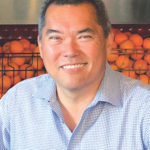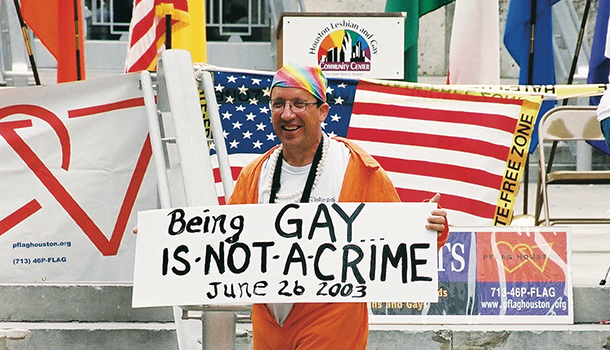
15 Years of ‘Lawrence v. Texas’
Why June 26 should be National Pride Day.

Supreme Court wonks like myself often think of June 26 as National Pride Day.
On June 26, 2013, the U.S. Supreme Court, in Windsor v. U.S., struck down as unconstitutional the federal Defense of Marriage Act’s interpretation of “marriage” and “spouse” as applying only to opposite-sex unions. On June 26, 2015, the court held in Obergefell v. Hodges that all states must lawfully recognize and perform marriages of same-sex couples.
But neither of these monumental rulings would have happened without the grandest Supreme Court decision of all, Lawrence v. Texas, decided on June 26, 2003.
I was fortunate to have had a special view of the Lawrence case. My dear friend of 20 years and law partner, Mitchell Katine, was legal counsel to the defendants, John Lawrence and Tyron Garner. I was recruited to be Lawrence’s “bodyguard” during the oral arguments in Washington DC, and Katine and I had seats in the front row directly beneath one of our heroes, justice Ruth Bader Ginsburg. We watched in awe as Lambda Legal attorney Paul Smith provided one of the most dazzling and compelling oral arguments ever witnessed in that monumental building. And we tried to pretend we weren’t from Texas when then-Harris County district attorney Chuck Rosenthal, appropriately on crutches, provided one of the worst arguments.

I became friends with both Lawrence and Garner, who for several years spoke every semester to the Sexual Orientation/Gender Identification Law class that I teach at South Texas College of Law Houston—among the few public speeches that Lawrence ever made. On several occasions, I was shocked to hear him tell my class that although he and Garner were arrested for purportedly engaging in intercourse, they were actually just sitting in his living room drinking beer. (At the time, I thought maybe he’d been drinking too much beer before speaking to my class.)
Professor Dale Carpenter’s definitive book on the Lawrence case, Flagrant Conduct, also reveals the seismic news that shortly before his death in 2011, Lawrence disclosed to Carpenter that he and Garner were in fact not engaged in sex. Rather, their arrests were almost surely the product of the law-enforcement officers’ flagrant homophobia (hence the title of the book). I love knowing that Lawrence shared this detail with my students long before the book came out, as well as the future movies that will surely be made about this incredible case.
Nearly every attorney who represented LGBTQ people in the years before Lawrence can recall judges, government attorneys, police, and other adjudicating officials premising decisions and orders—minor and major—on the “criminal” nature of the lives of our clients. Adoptions and child visitations were denied, and arrests were upheld. There were no bonds (or they were substantially higher) for ridiculously minor offenses and arrests made during raids on places where we congregated. Judgments were often granted in favor of prejudiced employers. In my early career, I represented many clients fleeing nations that persecuted LGBTQ people. It was always a challenge to argue for my clients seeking asylum in the U.S. that they could be arrested in their countries for being gay or lesbian, when 14 U.S. states (including Texas) had similar laws.
Texas Penal Code Statute 21.06 still makes it a Class C misdemeanor if someone “engages in deviate sexual intercourse”—basically defined to be any anal or oral sex, including with an object—“with another individual of the same sex.” Notice my use of the present tense in the last sentence. To this day—despite Lawrence—the Texas sodomy statute remains on the books. And I am aware of arrests that have been made under the statute since Lawrence. The cases were subsequently dismissed, but the continued existence of this law is staggering proof that the demons of prejudice persist in Texas.
But let there be no question—Lawrence powerfully blew open the doors that have allowed America to move closer than ever to true equality for LGBTQ Americans.
June 26, 2003, was a Thursday. Katine invited me and several attorney friends to his office to await the decision. It seemed like every TV camera in town was pointed at him sitting behind his desk when his phone rang. He was expecting the call would be from one of the Lambda Legal attorneys, but it was from his mother in Florida. She excitedly said, “Congratulations, son, you won!” She had seen the news on TV before any of us. Katine immediately called John Lawrence to share the news. Attorney Roger Donley had one of those new ultra-mod phones that could receive written messages, and he was reading us the decision as it came in. Within seconds, constitutional specialist Gerry Birnberg shouted excitedly, “We got everything!” We were all in tears as we listened to the immortal words of justice Anthony Kennedy: “As the Constitution endures, persons in every generation can invoke its principles in their own search for greater freedom.” I still can’t get through the class that I teach every semester about the Lawrence decision without tearing up.
If ever a day deserved to be designated as National Pride Day, it’s June 26.
This article appears in the June 2018 edition of OutSmart magazine.










